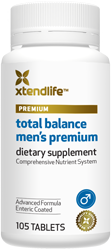Does Andropause Cause Erectile Dysfunction?
Andropause, called commonly male menopause, will affect most men over the age of 50 to some degree. It is one of the leading causes of impotence yet few men identify its often debilitating symptoms as the direct result of a decrease in testosterone levels.
Like menopause in women, andropause is the result of a decrease in the production of hormones in the body - in particular, testosterone. However, unlike menopause, the process occurs gradually and can take a decade or more before symptoms become apparent. These symptoms can be vague, so correct diagnosis is often overlooked.
It is accompanied by psychological and physical changes. Changes in attitude and mood include lethargy, fatigue, diminished enthusiasm, loss of physical and mental agility, and lack of libido. Physical symptoms include mild to severe erectile dysfunction, decreased muscle mass, loss of muscle strength, and increased body fat in the upper and mid torso.
Although a decline in testosterone levels occurs naturally with age, there is no way of predicting which men will experience andropausal symptoms of sufficient severity to seek medical help. Neither is it predictable at what age these symptoms will occur.
Andropause was first described in medical literature in the 1940s. However, tests to diagnose the levels of testosterone present in the body have been available only for a fairly short time. Hence the lack of medical research and knowledge about the condition.
How Andropause Causes Impotence
Male testosterone is produced in the testes and adrenal glands, and is essential for normal sexual function and producing erections. It also affects many metabolic activities such as production of blood cells in the bone marrow, bone formation, carbohydrate metabolism, liver function and prostate gland growth.
Testosterone is either free or bound to other substances throughout the body. Most of the binding occurs to a sex hormone-binding globulin (SHBG) which traps up to 98% of available testosterone. The remaining testosterone is called free or bioavailable testosterone.
The amount of SHBG in the blood increases with age, trapping more of the bioavailable testosterone, and making it unavailable for use elsewhere in the body. It's the bioavailable testosterone that promotes libido and ensures sexual performance. It also improves sleep quality, increases physical and mental energy and enhances mood and the sense of well-being.
Possibly the most significant effect of andropause (or the loss of bioavailable testosterone) for many men is the loss of libido, or sexual drive. Sexual arousal, even as a result of direct sexual stimulation, often takes much longer or is absent altogether. A number of men report an absence of sexual thoughts, feelings and behavior, with no fantasy or sexual responsiveness.
The amount of time taken to achieve an erection is prolonged, the force and volume of ejaculation is diminished, the rigidity of the erection is reduced and men report a noticeable decrease in pleasure.
If the levels of testosterone continue to fall, andropausal men cease to have erections during sexual activity, in their sleep or early in the morning. Most men will experience at least one of these symptoms, and to varying degrees, by the age of 55.
How is Andropause Treated?
Testosterone replacement can be highly effective in alleviating many of the symptoms of andropause.
Clinical studies have shown good responses to testosterone replacement therapy in men with low testosterone levels. These responses include:
- Improved libido and sexual performance
- Elevated mood and sense of well-being
- Increased physical and mental energy
- Decreased irritability, fatigue and anxiety
- Improved quality of sleep
Other benefits noted include improvement in bone density, enhanced muscle strength, a decline in fat mass and an overall sense of well-being.
Of course, any ongoing strategy to reduce the symptoms and risks of andropause should incorporate lifestyle improvements such as optimal diet, regular exercise, stress-management and the reduction of tobacco and alcohol intake.
Impotence drugs like Viagra®, Cialis® and Levitra® have also proven to be effective in the treatment of impotence caused by andropause.
Featured Men's Health Supplement

Check out Total Balance Men's Premium today!
Search Our Site
| advanced |
Popular Articles
Alcohol and ED
What causes impotence?
Best Natural Treatments
Non-Drug Options
Vitamins that can help
Foods that can cause ED
Erectile Dysfunction Age


